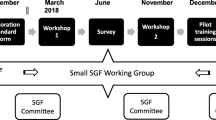Abstract
The clinical trial agreement (CTA) is a key but often underappreciated document governing the relationship between a study site and a sponsor. Previous anecdotal materials have suggested that investigators may not often be involved in the review or negotiation of the CTA and may attach little importance to it. To provide more systematic current information, survey methods were used to explore the level of engagement, knowledge, and perceptions of investigators in the United States. The survey was distributed to more than 700 investigators—university affiliated and nonaffiliated—and/or related study staff, of whom 167 responded. Most respondents identified that they did not manage the clinical trial agreement process but were actively engaged in its review. Most were encouraged by their institutions to participate. However, some respondents expressed concerns with regard to their satisfaction with the content of the CTA, particularly with respect to issues such as financial negotiations and payments, indemnification, and subject injury language. The majority of investigators either strongly agreed or agreed that it was important for the investigator to be actively involved in the CTA process. Data from this survey provide the first systematic look at the current practices of US investigators, possible issues, and areas for improvement from the investigator’s point of view.
Similar content being viewed by others
References
Webb T. A checklist for clinical trial agreements. Journal of Clinical Research Best Practices. 2006;2(2):1–3.
DuVal G. Institutional ethics review of clinical study agreements. J Med Ethics. 2003;30:30–34.
Drazen J. Institutions, contracts, and academic freedom. N Engl J Med. 2002;347:1362–1363.
Goldfarb N. Winning contracts. http://firstclinical.com/resources/articles/WinningContracts.pdf. Published 2004. Accessed July 9, 2012.
Goldfarb N. Laws, regulations and clinical trial agreements. http://www.firstclinical.com/resources/articles/Laws.pdf. Published 2004. Accessed October 25, 2013.
Pfeiffer J. Clinical Trial Agreements: Negotiation and Management. Saarbrücken, Germany: Scholars’ Press; 2014.
Schulman K, Seils D, Timbie J, et al. A national survey of provisions in clinical trial agreements between medical schools and industry sponsors. N Engl J Med. 2002;347:1335–1341.
Rijswijk-Trompert M. Clinical trial agreements: there are opportunities to make the negotiation process more efficient and reduce timelines. http://www.appliedclinicaltrialsonline.com/appliedclinicaltrials/CRO%2FSponsor/Clinical-Trial-Agreement-Negotiations/ArticleStandard/Article/detail/776904. Published June 1, 2012.
Mello M, Phil M, Clarridge B, Studdert D. Academic medical centers standards for clinical Trial agreements with industry. N Engl J Med. 2005;352:2202–2210.
Bodenheimer T. Uneasy alliance: clinical investigators and the pharmaceutical industry. N Engl J Med. 2000;342:1539–1544.
Davidoff F, DeAngelis C, Drazen J, et al. Sponsorship, authorship and accountability. N Engl J Med. 2001;345:825–826.
Baer I, Feiler M, Regulski A, Switzer S. Clinical Trial Contracts: A Discussion of Four Selected Provisions. Washington, DC: Association of American Medical Colleges; 2004.
Leibowitz K, Sheckler V. Negotiating clinical trial agreements. http://www.regulatoryfocus.org. Published 2012. Accessed September 12, 2013.
Goldfarb N, Regulski A. 18 subject injury and indemnification CTA loopholes. Journal of Clinical Research Best Practices. 2008;4(1):1–5.
Bradford J. Clinical trial research in hospitals. http://www.acegroup.com. Published 2012. Accessed September 11, 2013.
World Medical Association. Declaration of Helsinki: ethical principles for medical research involving human subjects. http://www.wma.net/en/30publications/10policies/b3/. Accessed September 2014.
Goldfarb N. Master clinical trial agreements. Journal of Clinical Research Best Practices. 2006;2(7):1–4.
Atkinson R, Flint J. Accessing hidden and hard-to-reach populations: snowball research strategies. Social Research Update. 2001;33:1–4.
Sadler G, Lee H, Lim R, Fullerton J. Recruitment of hard-to-reach research population subgroups via adaptations. Nurs Health Sci. 2010;12:369–374.
Hulley S, Cummings S, Browner W, Grady D, Hearst N, Newman T. Designing Clinical Research. 2nd ed. Philadelphia, PA: Lippincott, Williams & Wilkins; 2001.
Heckathorn D. Snowball versus respondent-driven sampling. Sociol Methodol. 2012;41:355–366.
US Geological Services. Online surveys. http://www.usgs.gov. Published 2013. Accessed August 10, 2013.
Rosenstock I, Strecher V, Becker M. Social learning theory and the health belief model. Health Educ Q. 1988;15:175–183.
Bronfenbrenner U. The Ecology of Human Development: Experiments by Nature and Design. Cambridge, MA: Harvard University Press; 1979.
Author information
Authors and Affiliations
Corresponding author
Rights and permissions
About this article
Cite this article
Pfeiffer, J.P., Richmond, F.J. Management of Clinical Trial Agreements. Ther Innov Regul Sci 49, 139–145 (2015). https://doi.org/10.1177/2168479014551645
Received:
Accepted:
Published:
Issue Date:
DOI: https://doi.org/10.1177/2168479014551645




